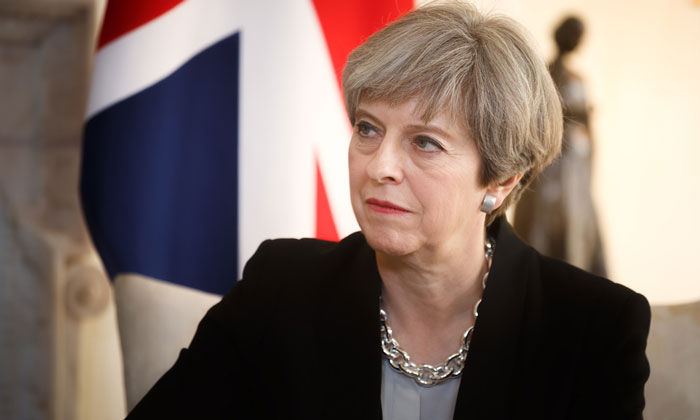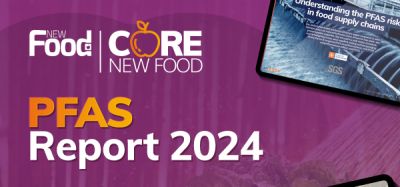UK Food and Drink Federation ‘welcomes’ 25-year environment plan launch
- Like
- Digg
- Del
- Tumblr
- VKontakte
- Buffer
- Love This
- Odnoklassniki
- Meneame
- Blogger
- Amazon
- Yahoo Mail
- Gmail
- AOL
- Newsvine
- HackerNews
- Evernote
- MySpace
- Mail.ru
- Viadeo
- Line
- Comments
- Yummly
- SMS
- Viber
- Telegram
- Subscribe
- Skype
- Facebook Messenger
- Kakao
- LiveJournal
- Yammer
- Edgar
- Fintel
- Mix
- Instapaper
- Copy Link
Posted: 12 January 2018 | George Smith (New Food) | No comments yet
Among the actions outlined is a pledge to eliminate all avoidable waste by 2050 and all avoidable plastic waste by end of 2042.


PLASTIC FREE: The announcement marked Theresa May's first major speech on the environment
On Thursday January 11, UK Prime Minister Theresa May launched A Green Future: Our 25 Year Plan to Improve the Environment.
In her introduction to the plan, Mrs May said: “Its goals are simple: cleaner air and water; plants and animals which are thriving; and a cleaner, greener country for us all. We have already taken huge strides to improve environmental protections, from banning microbeads which harm our marine life to improving the quality of the air we breathe to improving standards of animal welfare.
“This plan sets out the further action we will take. By using our land more sustainably and creating new habitats for wildlife, including by planting more trees, we can arrest the decline in native species and improve our biodiversity. By tackling the scourge of waste plastic we can make our oceans cleaner and healthier.”
It promises that the Government will “work towards eliminating all avoidable waste by 2050 and all avoidable plastic waste by end of 2042”.
Reacting to the plan, Helen Munday, Chief Scientific Officer of the Food and Drink Federation (FDF), said: “FDF and its members welcome the launch of Defra’s 25 Year Environment Plan and its long-term commitment to clean sustainable economic growth. We look forward to studying the details of the Plan, and hope that it will sit alongside the Industrial Strategy in the creation of a long-term framework in which businesses can operate. It’s pleasing to note that the Prime Minister remains committed to an evidence-based approach to establishing the best way to deal with plastic waste and will consult widely.
“The food and drink manufacturing industry has an essential interest in protecting and enhancing the natural environment because of its reliance on a continuous, adequate supply of safe, high quality raw materials. Our members continue to show industry-leading dedication to sustainability, both individually and through our Ambition 2025, a set of collective environmental ambitions for the industry.
“FDF strongly supports initiatives to reduce waste throughout the food and drink value chain and to increase resource efficiency. We have also been working with our members to better understand and protect natural capital, including the protection of Britain’s countryside.”
The Foodservice Packaging Association (FPA) also welcomed the plan. A spokesman said: “The FPA is already working closely with the government, Defra and various Committees to develop understanding of alternative ways of achieving the same objectives particularly the reform of the UK’s Producer Responsibility mechanism the PRN system. We believe Defra has moved PRN reform up its priority list and look forward to consulting with them.
“The Prime Minister said that all EU environmental laws and regulations will be incorporated into UK law when we leave the Union. We welcome this as we believe this could include directives on the circular economy package which requires us to keep materials in circulation for as long as possible. We are committed to increasing recycling and believe this should feature strongly as part of the environment plan.
“The FPA is participating fully in the Treasury’s call for evidence regarding the possibility of taxing single use plastics.”
The plan announced a new ‘cross-sector’ commitment to tackling plastic waste with sustainability charity WRAP. This, it said, will align with the Ellen MacArthur Foundation’s New Plastic Economy and have an initial focus on plastic packaging.
Marcus Gover, CEO at WRAP, said: “So far the solutions to plastic waste have been piecemeal. I am pleased to be leading this holistic initiative which will transform the UK’s plastics system. Working with the Ellen MacArthur Foundation, we will bring together every ‘body, business and organisation’ involved in the life-cycle of plastics to make the move from a throw away culture to one where resources are used over and over again.”
Related topics
Related organisations
Food and Drink Federation (FDF), Foodservice Packaging Association (FPA), WRAP









